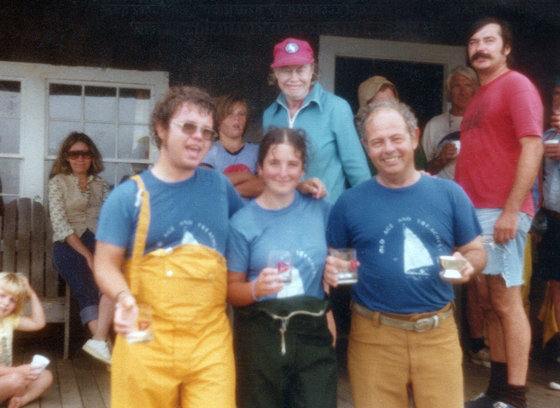From the time I was old enough to ride a bike until I graduated from college, I spent every spare summer moment I could at the Woods Hole Yacht Club. I had many friends there, but one of the best was Robert Otis Bigelow.
Bob was a local racing hotshot, so when he asked me to sail a Knockabout race with him, I was just thrilled. Even as a very green ten year old I understood that this was a big opportunity—and an honor.
I don’t remember who the other member of our crew was the first time I sailed on Blue Jean. But I do remember my first lesson from Bob—because he took time out from trying to win to explain a basic fact of sailboat racing. “See, he’s crossing ahead of us now,” he said, not as a teaching moment but just as a mention of what was going on around us. “The last time we came together we were ahead of him. There’s less current inshore—we’ve got to get in there.”
There were many, many more lessons over the next ten years, as I became part of the regular racing crew on Blue Jean. At thirteen he let me steer a weeknight series race, my very first taste of making my own mistakes. And by fifteen, I was taking his boat out with my own team. His belief in my basic ability to handle his carefully maintained boat made me a very loyal crew on the weekends—a win for all. As a teenager, it’s often easier to absorb lessons from a source outside your own family, and it’s also easier to learn basic sailboat racing on smaller boats. Bob made the most of his unique position to pass along his knowledge, and I soaked it up like a sponge.
On shore, Jean, Bob, John, Peggy, and Carol Bigelow all welcomed me into their family. I spent so much time at their house the summer I was fifteen that when my dad ran into Bob at the Yacht Club one afternoon, they joked about who should be paying for my college tuition in a few years.
And I wasn’t the only Bigelow adoptee. Their house was a meeting place for neighbors of all ages, brought together by our common love of racing small sailboats. Seated around the picnic table that was the social center of the house, I remember a lot of laughter, and a sense of community that easily bridged the many generation gaps. Everyone who came through the door was welcomed—especially if they brought a story to share.
Bob loved to tell stories about the twists and turns of fate. Whenever Yacht Club history came up, he’d tell the tale of taking over as Commodore in 1954, just before the clubhouse was demolished by Hurricane Carol. He never let us forget that the Three Mile Island disaster struck on his own 50th birthday. (Bob worked in the nuclear power industry.) And then there was the best twist of all, about how he and Jean met after being paired up as the two shortest members of a three-couple blind date. “Height is destiny,” he would crow, decades of happy marriage later. I wish he’d written his memoirs, since I’m sure I’ve forgotten (or never heard) some of the best tales he had to tell.
I first realized how much I’d learned from Bob when I started sailing in college. The priorities were much different racing lighter boats, especially on short courses that weren’t skewed by strong currents. But the tactics, strategy, and communication were the same.
He also passed along his drive to win, a deep-rooted determination that never was allowed to override sportsmanship. By example, he showed me how to learn from my mistakes, and that little things (like remembering to bring beer, and team T-shirts that read “Old Age and Treachery”) mean a lot.
I never thanked him directly for all his valuable lessons. But the Cape Cod Times passed along the message—and gave him some press of his own. An edition that came out during the 2004 Olympics showed a picture of my Olympic Yngling team on the front page, with a picture of Bob right below it; he was identified as my sailing mentor. “He never failed to answer any question I could think of,” I told the reporter. (Bob’s photo is missing from the online version, unfortunately.)
My favorite part of the article comes toward the end, when Bob admits his skepticism about my push toward such a lofty goal as the Olympics:
“I thought, be realistic,” he said. But now, he’s convinced. “Clearly, I wasn’t the one being realistic,” he said. “I didn’t think it was going to evolve to this level.” Sometimes mentors can’t see how solid a base they’ve built.
I had several other teachers along the way, including my own parents. But Bob’s lessons built an early and solid foundation of both skill and attitude. And that foundation took me much farther than either of us ever imagined back in 1974, when we were tacking upwind trying to figure out if we were behind or ahead.
Sail on, Robert O. Your memory and your lessons live on in the many, many lives you touched.

One Reply to “Eight Bells: Robert Otis Bigelow”
Comments are closed.